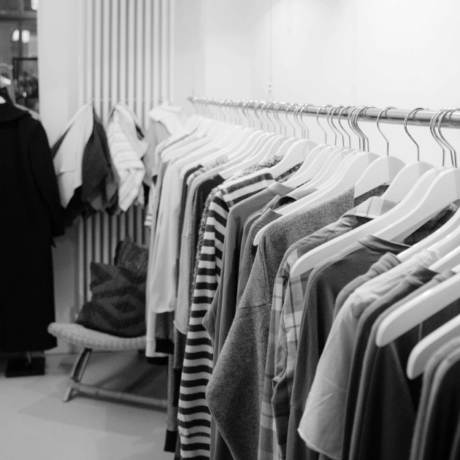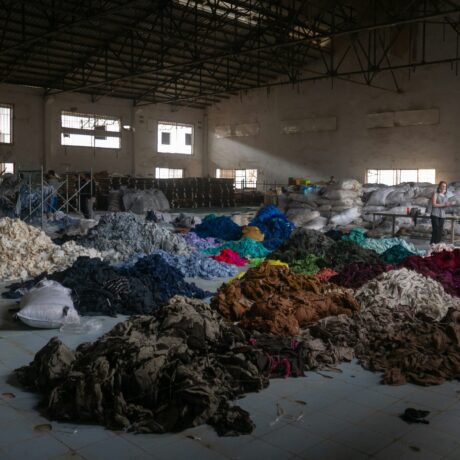Ethical Fashion 2020: a New Vision for Transparency
On Monday 29 June 2015 in the UK House of Lords, industry leaders, press and political leaders attended the roundtable debate Ethical Fashion 2020: a New Vision for Transparency. The aim of the event was to help to shape a vison of what transparent supply chains could look like in five years time and set out what steps are needed to transform the fashion industry of the future.
The event at the House of Lords, now in its second year, was co-hosted by Fashion Revolution, the Institution of Occupational Safety and Health (IOSH) and the All-Party Parliamentary Group on Ethics and Sustainability in Fashion.

Introducing the event, IOSH Chief Executive Jan Chmiel said
“Transparency matters because it can drive improved workplace standards. It can also increase recognition of good health and safety performance. And importantly, it can help ensure more people view health and safety as an investment, not a cost – one that saves lives, supports business and sustains communities. Whereas, a lack of transparency can do the reverse. Crucially, it can mean that firms don’t know the factories that are supplying them, so they can’t actively manage their risks – potentially leading to tragedy, disaster and business failure”.
Co-founder of Fashion Revolution, Carry Somers, set the scene as to why transparency is a crucial issue to address over the next 5 years
“So much is hidden within the industry, largely because of its scale and complexity. The system in which the fashion and textiles industry operates has become unmanageable and almost nobody has a clear picture how it all really works, from fibre through to final product, use and disposal.
The low or non-existent levels of visibility across the supply chain highlight the problematic and complex nature of the fashion industry. A few brands have received a lot of public pressure to publish information about their suppliers and some have responded by disclosing parts of it. Yet, the rest of the industry remains very opaque. It’s not just brands; it’s the myriad other stakeholders along the chain too. We believe that knowing who made our clothes is the first step in transforming the fashion industry”.
The two hour debate, chaired by Lucy Siegle, acknowledged where progress needed to be made, highlighted opportunities for change and set out a vision for how the fashion industry could and should look by 2020.
Some of the key points made by the speakers are set out below:
Peter McAllister, Executive Director of the Ethical Trading Initiative
- We need to break down what transparency looks like and define what the journey looks like, so we get a virtuous circle.
- Smart regulation drives behaviour. Once the environment is predictable, business can work within that environment. What is difficult is when business can’t predict when wages will rise or fall, when there will be a strike, etc.
- We need mechanisms where workers are represented not where they are just at the receiving end of good intentions
- We want to see the UN Guiding Principles on Human Rights become a rallying call to transform fashion industry and see this fully implemented by 2020. Companies need to undertake human rights due diligence, understand the impacts and take the remedial action required. This underpins the need for transparency.
- We can’t wait for a crisis – we need to put national and private mechanisms in place. We need to set up platforms in key places such as China and India to influence change in producer countries.
- Bangladesh is still a young country with weak infrastructure. The Accord and the Alliance were the right response at the right time. It is an attempt to turbocharge the effort of the Bangladesh government to set up their own mechanisms. It is designed to be a contribution to a longer term shift, of which we are yet to see the green shoots.
- Transparency is coming at companies, whether they like it or not – better to get ahead of the curve. The best way to get change is to inspire competition between companies.
- This sector is well overdue transformative change, not just twiddling at the edges
Rob Wayss – Executive Director of The Bangladesh Accord
- Accord signatories were placing “unprecedented” requirements on their suppliers.
- Even though there had been a positive response to the Accord, much more needs to be done including the increasing the pace of remediation works in factories and ensuring workers are able to raise safety concerns without fear of reprisal. If other workers see that raising safety concerns leads to hassle, they won’t express worries themselves.
- The Accord is based on a 5 year agreement. Health and Safety Committees have been put in place in all factories, remedial action is being taken, factories are working with union representatives.
- Transparency is the key to progress and the way the Accord works. We publish inspection and disclose non-compliance.
- Inspections for the Accord were carried out by world class engineers who worked alongside Bangladeshi engineers. I would like to see the assessments based on scientific engineering principles.
- Money, resources and political will are needed to change the way we do business.
- A kite mark on garments to verify ethical production would be very difficult as would need to verify what is the standard, who is assessing and monitoring. It is very high risk and it is not very meaningful, even though there is an appetite for this amongst consumers.
- The media has an important role to play as it creates pressure. Where there are legitimate article expressing valid criticisms, we respond accordingly. However, some articles in the Bangladeshi press were perhaps generated by factory owners who wanted to see the pace of the Accord slowed down.
Baroness Young of Hornsey – All-Party Parliamentary Group on Ethics and Sustainability in Fashion.
- You can only make a choice if you have information and that information turns to knowledge
- More businesses need to be more honest.
- We need to think more creatively and outside of the box of usual business models.
- Legislation won’t solve the whole problem but it can promote cultural change, as we’ve seen with the Equality Act.
- The government had to be encouraged to put the transparency clause in the Modern Slavery Bill in place by business. Loopholes in law which still exist around Modern Slavery Act will be stricter by 2020.
- The fashion industry is different to other industries as it has such a widely distributed supply chain. I’d like to see pressure building so companies can make progress on their public statements over the next five years as to how they are addressing modern slavery within their supply chains.
- We need more empowerment of consumers, business and politicians so this becomes so much part of life that we don’t need to think about it.
- The idea of a kite mark on the surface seems attractive but it simplifies what is an incredibly comples area. How do you make calculations which balance the social and the environmental?
- We can’t assume Made in Britain is OK. One member of the APPG saw conditions in a garment factory in East London last week as bad as those you would see anywhere in the world.
Simon Ward – British Fashion Council (BFC)
- The BFC has a three-year strategy to put sustainability at the heart of all we do. BFC is undertaking a collaboration with Marks and Spencer through the Positive Fashion initiative to promote best practice in order to stimulate real and meaningful change, highlighting the practical toolkit for designers which incorporates sustainability.
- There is a a need to find creative solutions and look at things differently. For instance, the BFC worked with the government to set up a draft standard on fashion apprenticeships as a solution to the problem of unpaid interns.
- We’re on an endless hamster wheel, more & more, cheaper & cheaper. How can we break the madness & tell a positive, creative story? People warm to the story and telling the story behind an item of clothin is an entrancing way to give insight into the people behind the clothes. It provides a compelling motivation for change.
Garrett Brown of the Maquiladora Health and Safety Support Network
- We need public listing of supply chains
- We need public disclosure of monitoring timelines and remedial action
- We need meaningful participation by workers, including training to give them the information and authority to act without retaliation.
- Sourcing is currently driven by the lowest price, highest quality, fastest delivery, with a window dressing of CSR.
- It is a pre-requisite that governments have the will and the resources to enforce the regulations, but in most places in the developing world this isn’t the case. In Bangladesh, it should be the government enforcing regulation and the Accord is a real step towards achieving this. Mexico has strong health and safety legislation, as strong as the US, but it has high foreigh debt, so won’t do anything to deter investents. This is why workers need to protect themselves.
- Transparency is only as good as the information that you get
Finally, Lucy Siegle asked the panellists what one thing would make a massive difference by 2020?
Garrett Brown: The Accord model of public discoloure is critical. Brands have to disclose where their factories are and tell us about the conditions.
Simon Ward: A lot of big and complex change is required. We need a magic story to tie it all together so it is understandable.
Baroness Lola Young: Information leading to activism. Supporting organisations like Fashion Revolution which are build on the work of other organisation like the EFF, ETI, Labour Behind the Label. Information needs to be acted on and we need coalitions like Fashion Revolution which can lobby for change.
Rob Wyass: Audits, credibly performed
Peter McAllister: The ETI has made a commitment to develop a public form of the audits of their companies which we hope will showcase some of the best performers.
After the debate, guests adjourned to River Room, overlooking the Thames, for a drinks reception and networking. Baroness Lola Young and Lord Speaker, Frances de Souza, both gave speeches at the reception and many of the guests were filmed for an upcoming series of mini films being produced and directed by Fashion Revolution as part of the European Year for Development.
The event at the House of Lords brought together many of the key people from within the fashion industry and beyond who are at the forefront of creating meaningful change. The challenge now is to translate the vision set out for transparency in 2020 into a reality in order to transform the fashion industry of the future.

Photo credits: Arthur & Henry, Zoe Hitchen, Orsola de Castro and IOSH










